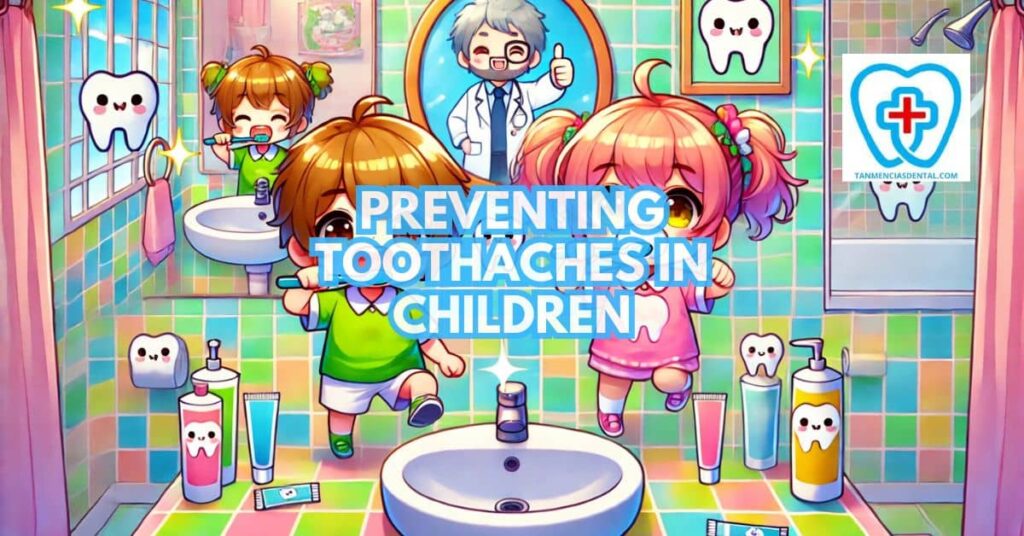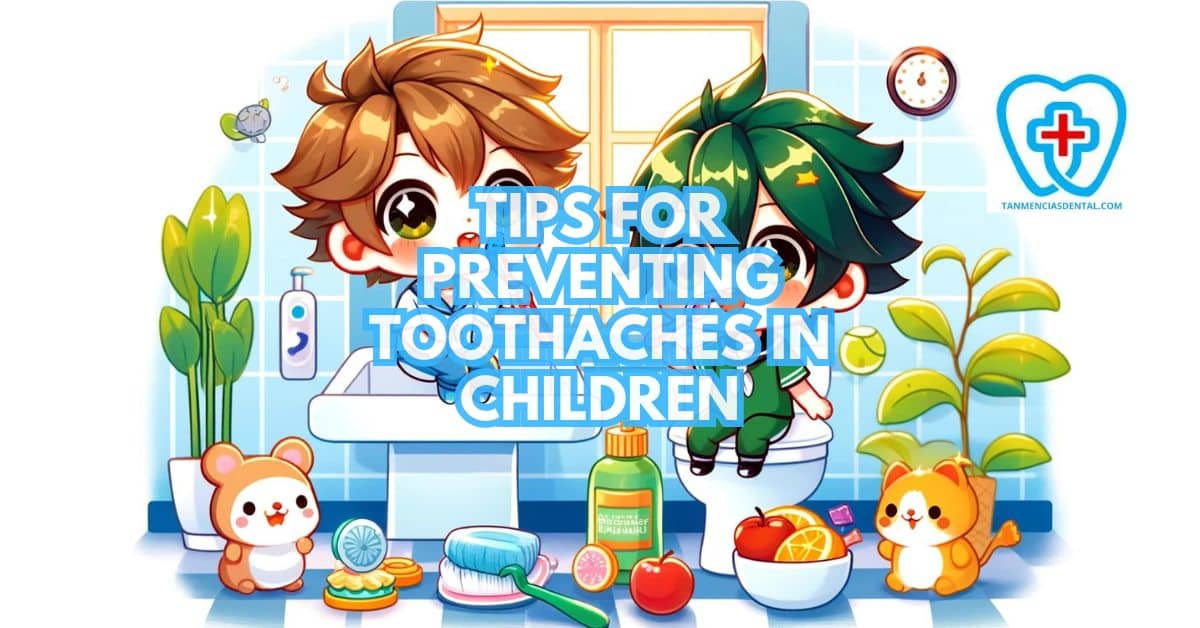Toothaches can make it difficult for children to eat, sleep, and enjoy their daily activities, causing them discomfort and irritability.
Preventing toothaches in children is essential to avoid serious dental problems like cavities and infections that may require extensive treatment.
Teaching kids good dental hygiene habits from a young age helps stop tooth decay and other oral health issues before they start.
Healthy teeth also support proper nutrition and clear speech development.
By focusing on preventing toothaches in children, parents can ensure their kids have comfortable, confident smiles for years to come.
1. Brushing Basics for Little Brushers: Building Healthy Habits Early On
Teaching your child to brush their teeth effectively begins with a clear explanation of why brushing is crucial for preventing tooth decay and tooth pain.
Show them the correct brushing technique, ensuring they understand the importance of reaching every tooth.
Using a timer or playing a favorite song can help your child brush for the recommended two minutes, ensuring all surfaces are thoroughly cleaned.
Demonstrate fun and easy methods, like making small circles on their teeth with the brush, to keep them engaged and effective in their brushing.
Choosing a fluoride toothpaste is vital, as it fortifies tooth enamel against decay, which can lead to tooth pain if neglected.
Establishing a consistent routine of brushing in the morning and before bedtime helps your child maintain good oral health habits.
This regular practice not only fights tooth decay but also aids in the early detection of any oral issues, allowing you to help your child keep their smile healthy.
🦷 The Importance of Kids’ Braces: Creating Bright Smiles for Little Faces
2. Supervise Brushing: Ensuring a Thorough Clean for Developing Smiles
Young children often mimic adults but may not grasp the importance of brushing every tooth surface.
Supervising their brushing until they are about six to eight years old ensures they are not missing spots, especially in the back of the mouth, where cavities often start.
You can use this time to teach them about the amount of pressure needed to clean teeth without causing gum damage.
Watching how your child brushes also allows you to correct their grip on the toothbrush, ensuring they can control it comfortably.
Positive reinforcement and occasional rewards for good brushing can motivate them to maintain good habits.
🦷 Braces Removal: How Long Does It Really Take?
3. Brushing Tools for Tiny Hands: Choosing the Perfect Toothbrush for Your Child
The right toothbrush has a small, soft brush head and a large, comfortable handle that a child can hold easily.
Toothbrushes with fun designs or characters can make brushing more appealing to children, encouraging them to brush regularly.
Electric toothbrushes can be particularly effective for kids who find brushing tedious, as they combine efficiency with an element of fun.
Change your child’s toothbrush every three to four months, or sooner if the bristles become frayed, to keep it effective and hygienic.
Always allow your child to have a say in selecting their toothbrush, as this can enhance their willingness to use it daily.
🦷 Top Teeth-Friendly Foods You Should Be Eating
4. Flossing Fun: Making Flossing a Breeze for Sparkling Smiles
Introduce flossing as soon as your child has two teeth that touch.
You can make flossing easier and more fun by using pre-threaded floss picks specially designed for small hands and mouths.
Demonstrate how to gently slide the floss between the teeth and move it up and down against the tooth surface to remove plaque.
Incorporate storytelling or a reward chart to make the routine more engaging and something they look forward to.
Regular flossing is essential to preventing tooth decay and gum disease by removing food particles and plaque that brushing alone can’t reach.
🦷 Why Does a Broken Tooth Smell? The Causes and How to Treat It

5. Dental Sealants: Extra Protection for Kids’ Teeth
Dental sealants are thin, protective coatings that dentists apply to the chewing surfaces of a child’s back teeth.
These sealants create a barrier that keeps out plaque and food particles, which can cause cavities.
Since children’s molars have deep grooves that are hard to clean with a toothbrush alone, sealants help prevent decay in these tricky areas.
Applying dental sealants can significantly lower the risk of toothaches by protecting vulnerable spots from bacteria.
This simple step ensures your child’s teeth stay healthy and strong for years to come.
🦷 Brushing Made Fun: Tips for Adults to Enjoy Dental Care
6. Sugary Showdown: Limiting Treats to Prevent Toothaches
Frequent consumption of sugary foods and drinks is one of the leading causes of tooth decay in children.
Encourage healthy eating habits by offering fruits and vegetables as snacks instead of candies and cookies.
Explain to your child how sugar interacts with bacteria in their mouth to create acids that can harm their teeth.
It’s helpful to set specific times for sweet treats, ideally as part of a meal rather than as separate snacks.
Always ensure your child brushes their teeth after consuming sugary foods to minimize the risk of decay.
🦷 Energy Drinks and Your Teeth: A Hidden Danger
7. Diet During Development: Building Strong Teeth from the Start
A diet rich in vitamins and minerals is crucial for the development of strong, healthy teeth.
Foods high in calcium, such as milk, cheese, and yogurt, strengthen tooth enamel and help prevent cavities.
Include phosphorus sources like eggs, fish, and lean meat, which work with calcium to maximize its benefits.
Vitamins A, C, and D are also important for oral health, supporting gum health and the absorption of calcium.
Encourage your child to eat a balanced diet to support not just their dental health but their overall growth and well-being.
🦷 Why a Full Oral Evaluation is Key to Your Best Dental Health
8. Water Power: Keeping Your Child’s Smile Hydrated and Healthy
Drinking water, especially if it’s fluoridated, is one of the best beverages for maintaining oral health.
Water helps wash away food debris and keeps the mouth’s pH level balanced.
Teach your child to drink water after each meal and to choose water over sugary or acidic drinks like soda or juice.
If your local water supply isn’t fluoridated, ask your dentist about fluoride supplements.
Keeping hydrated is also essential for overall health, helping every system in your child’s body function at its best.
🦷 Soothe That Ache: Natural Remedies for Quick Tooth Pain Relief
9. Fluoride Fun: Strengthening Teeth with the Fluoride Advantage
Fluoride is a natural mineral that helps harden the enamel on children’s teeth, making them more resistant to decay.
Ensure your child uses toothpaste with fluoride, as it’s a primary defense against cavities.
Discuss with your dentist the possibility of fluoride varnishes or supplements if your drinking water is not fluoridated.
Make the application of fluoride fun by calling it a “tooth shield” that fights off cavity monsters.
Regular exposure to small amounts of fluoride can dramatically decrease the incidence of toothaches in children.
🦷 What’s the Price Tag? How Much Does Braces Removal Really Cost?
10. Teething Troubles: Soothing Discomfort and Recognizing Toothache Signs
Teething is often a challenging time for infants and toddlers, as the emergence of new teeth can cause noticeable discomfort.
To help alleviate this, provide safe, chilled teething toys that your child may chew on to ease the gum discomfort.
It’s crucial to watch for signs that might indicate a serious toothache, such as persistent crying, a refusal to eat, and disturbances in their normal sleeping patterns, as these symptoms can suggest more than typical teething pain.
Gently massaging your child’s gums with a clean finger can also offer temporary relief and soothe the sore areas.
For natural pain relief, applying a small amount of clove oil diluted in carrier oil can be effective; however, it’s important to use this sparingly and with caution, as it is potent.
Home remedies like these can be helpful, but they should never replace professional advice.
If you suspect that your child’s discomfort is severe or not typical of normal teething, it’s essential to consult your pediatric dentist to ensure proper care and treatment.
🦷 Need a Dentist on Sunday? How to Find Emergency Care When You Need It
11. Dental Visits Don’t Bite! Making Checkups Fun and Routine
Normalize dental visits by starting them at an early age, ideally around their first birthday or when the first tooth appears.
Choose a pediatric dentist who specializes in pediatric dentistry and creates a kid-friendly office environment to make children feel comfortable.
Prepare your child for dental visits by using books or videos that show the dentist in a fun and positive way.
During checkups, the pediatric dentist can identify signs of inflammation in the gums early, preventing more serious issues.
Consider rewarding your child after each visit with a small, non-food treat or a fun activity to help reduce any fear and build positive associations with dental care.
Regular dental visits help reduce the risk of cavities and other dental problems by catching them early.
Consistent, positive dental visits ensure that your child maintains good oral health and learns the importance of taking care of their teeth.
👨⚕️ Conclusion
Maintaining your child’s dental health is a crucial part of their overall well-being.
Engaging in regular dental hygiene practices, eating a balanced diet, and visiting the dentist routinely form the cornerstone of good oral health.
Start these habits early to instill a lifetime of healthy smiles and prevent future toothaches.
Remember, the effort you put into caring for your child’s teeth today will pay off throughout their life.
By taking these proactive steps, you are setting up your child for a future of healthy teeth and happy smiles.
😊 Self-Promotion
Visit us at Tan-Mencias Dental Clinic in Parang, Marikina City, where your family’s smiles are our top priority!
Our friendly team is dedicated to providing you with the best dental care in a comfortable and welcoming environment.
Whether you have questions or need to schedule an appointment, you can easily reach us at 9171451074, send us a message through our Facebook page, or use the contact form on our website.
We’re here to help with all your dental needs and ensure your visit is a pleasant experience.
Let us take care of your smile and see why our patients love coming back!

